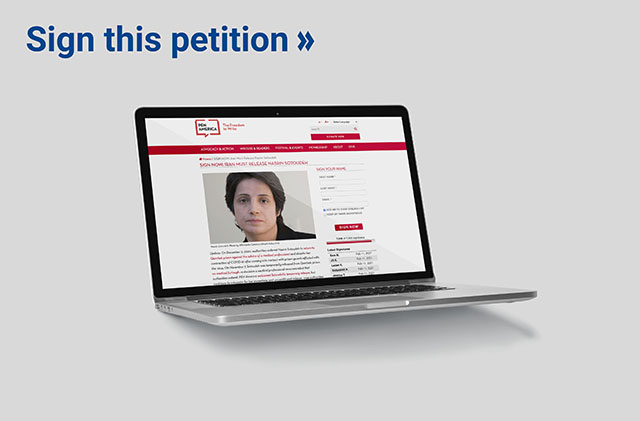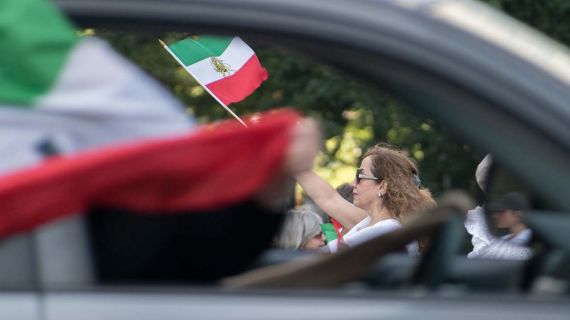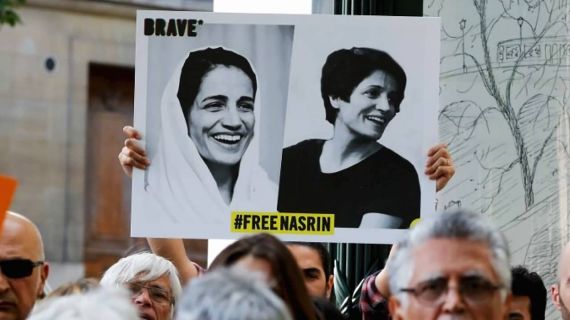The Case of Nasrin Sotoudeh
New York/Ottawa/The Hague
On 18 February 2021, Parliamentarians for Global Action and the Raoul Wallenberg Centre for Human Rights co-hosted a panel discussion on the documentary film NASRIN and how legislators can support at-risk human rights defenders.
The event included the participation of Members of Parliament from different regions, civil society organizations, and academia, and was moderated by Mr. Ali Ehsassi, MP (Canada), PGA Board Member.
The following panel of leading experts made inspiring presentations:
- Mr. Ali Ehsassi, MP (Canada), PGA board member
- Mr. Jeff Kaufman - Director, Producer, Writer
- Ms. Marcia S. Ross - Producer
- Prof. Irwin Cotler, Chair, Raoul Wallenberg Centre for Human Rights (RWCHR); former Minister of Justice and Attorney General of Canada; former Chair, PGA Canada National Group
- Hon. Rozaina Adam, MP (Maldives), Chair of the Parliamentary Rapid Response Team (PARRT), PGA.
- Ms. Shaparak Shajarizadeh, Women's Rights Activist and a former Political Prisoner Senior Fellow, RWCHR
In his introductory remarks, Mr. Ali Ehsassi conveyed to the audience that this panel discussion is a great opportunity to examine Nasrin Sotoudeh and other jailed human rights defenders’ cases in greater detail. The moderator also stressed that this event would explore concrete actions parliamentarians around the world can take to protect those who “dare to fearlessly act as the voice of the voiceless.”
While reminding participants that the documentary film was made to connect those who advocate for human rights in Iran, the film director and producers, Jeff Kaufman and Marica Ross, screened two short video clips which illustrated Nasrin’s work and fight over the last decades for women’s rights in her country. As reflected in the documentary, the revolutionary “street movement” she instigated on behalf of women and young girlsultimately led to her imprisonment in 2018 and conviction to 38 years in prison and 148 lashes.
Prof. Irwin Cotler - a tireless advocate for the protection of human rights -, and Hon. Rozaina Adam, outlined initiatives that Members of Parliament have taken to support Nasrin, and concrete actions they can pursueto not only support Nasrin but also other human rights defenders. As expressed by Prof. Cotler, there have been many concrete initiatives that parliamentarians in Canada have taken to support human rights defenders, namely:
- The “Iran accountability week” initiated in 2010, in which Canadian MPs discussed human rights situations in Iran, and the pain and plight that women, journalists, and other minorities have gone through;
- The “Global Iranian political prisoner advocacy project” where Canadian MPs across the political spectrum would “adopt”/support a political prisoner in Iran and use their prerogatives to advocate on their behalf;
- The Canadian Parliament arranged with The National Post newspaper, to run each day, for a week, op-eds by each of the parliamentarians who have taken up a case to protect a human rights defender or political prisoner;
- Established an interparliamentary coalition for human rights in Iran which involved American congressmen/women, senators, and Members of the European Parliament;
- Work closely with the former United Nations Special Rapporteur on Human Rights in Iran, Ahmed Shaheed; and
- Established, by way of a parliamentary resolution, an Iranian Political Prisoner day, on 1 September, to commemorate the thousands of dissidents in Iran who were murdered in 1988.
The RWCHR and PGA have recently entered into a partnership agreement regarding a project on Democratic Renewal and Human Rights and one of its components, the Parliamentary Rapid Response Team (PARRT), is currently carrying-out emergency responses on behalf of imprisoned parliamentarians and human rights defenders. On this specific note, Hon. Rozaina Adam, chairperson of this cohort of committed legislators listed some of the actions takenin situations where parliamentarians and human rights defenders are at risk. PARRT adopted a similar approach to the Canadian and the German Parliaments – members are paired with MPs or human rights defenders who need urgent support.
PARRT founding member, Mr. Anders Österberg, MP (Sweden), sent a pre-recorded video where he expressed his support to Nasrin and highlighted actions taken in his Parliament to raise awareness of her case and that of other at-risk human rights defenders. In the same vein, Hon. Adam emphasized that to address threats to democracy and human rights, legislators can:
- Engage in peer-to-peer conversations with parliamentary colleagues and relevant stakeholders;
- Participate in high-level international fora such as the United Nations and regional organizations, events, and conversations on social media on the cases of human rights defenders and the need to protect them;
- Make official statements, resolutions, draft laws, and pose questions to the relevant Ministries to address specific cases and provide legal and political remedies;
- Ensure the implementation of international instruments that protect human rights defenders; and
- Vote laws that strengthen the domestic Rule of Law in line with human rights treaties and the Sustainable Development Goals (SDGs)
To conclude, Hon. Rozaina stated that “[l]egislators worldwide must use their parliamentary prerogatives and influence to resists attacks on democracy, shape national agendas, resist incursions from the executive branch and work with civic society to preserve civic and political spaces… As Parliamentarians, we can make the most difference. Actions speak louder than words. Legislators must demand the unconditional and immediate release of Nasrin, whose detention is unlawful and politically motivated, as well as those of other human rights defenders.”
Finally, Ms. Shajarizadeh, one of the individuals who spearheaded the “White Wednesday” initiative in Iran to protest against the compulsory Hijab, made a very compelling and emotional testimony that reflected on her plight as a former political prisoner and the suffering endured by other women and human rights defenders in the country. According to Ms. Shajarizadeh, “for more than 40 years, the government of Iran has used the Hijab as a tool to repress women. The government, and its followers routinely abuse women to prevent them from having any important role in society.”
Nasrin’s work on behalf of children and women represents the real struggle, persecution, and prosecution that women, activists, journalists, religious groups, and ethnic minorities in Iranian continuously face. Unfortunately, as Ms. Shajarizadeh conveyed, “human rights defenders in Iran have not only sacrificed their own lives but also their loved ones’.” She encourages governments to do more to protect them, such as imposing Magnitsky targeted sanctions on those Iranian officials who have committed human rights violations and those judges who sentenced political activists and protesters to unlawful executions.






